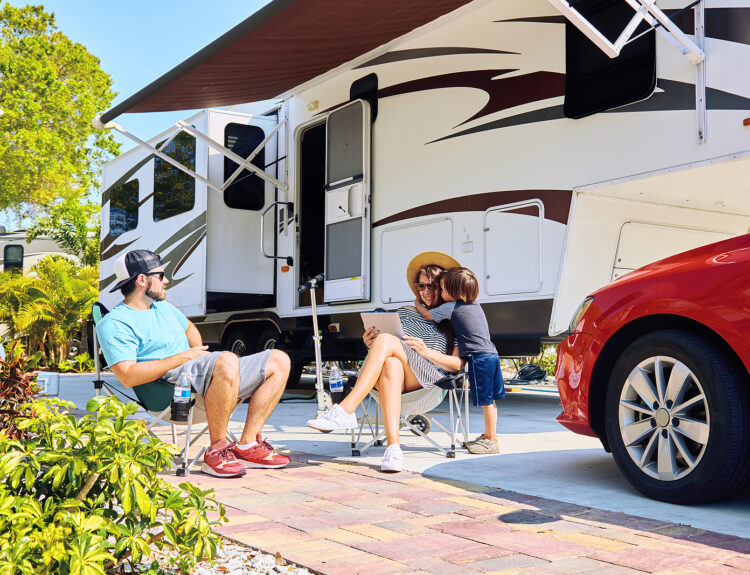Have you ever wondered what it takes to own a campground? In this article, we will unfold the tapestry of opportunities and challenges that come with campground ownership. From the evolving demographics of RV park guests to the nuanced factors impacting annual campground income, we embark on a journey to explore the complexities of this industry.
Drawing on insights from market analysis and comprehensive reports from industry specialists, we delve into the financial and operational trends shaping the future of RV parks and campgrounds. We will provide insider insights on average annual incomes and tips for increasing profitability.
This introduction sets the stage for RV park entrepreneurs in North America to gain a broad understanding, not just of the challenges and rewards that come with the territory, but also of the actionable strategies to thrive in the burgeoning outdoor hospitality sector.
The State of the RV Park Industry
The growth of the RV park industry in North America reflects an increasing preference among travelers for experiences that blend the comfort of home with the allure of the great outdoors. In recent years, this industry has witnessed a remarkable surge in interest, driven by shifts in travel behavior, demographic changes, and a collective yearning for more authentic, nature-based experiences.
The market size and revenue figures for the RV park sector are telling of its significant impact and potential. Over the past five years, industry revenue has grown at a CAGR of 4.3% and is expected to reach an estimated $10.7bn in 2024.
This upward trend is expected to continue, with projections indicating further growth. This growth is underscored by a historic surge in RV sales and an increasing number of households embracing RV travel, signaling a robust demand for RV parks and campgrounds.
Furthermore, the industry has seen a demographic shift, with the average age of first-time RV buyers dropping, suggesting that millennials and Gen Zers are increasingly drawn to RVing. This shift not only indicates a broader appeal of RV parks but also hints at the necessity for these businesses to adapt to the digital and amenity preferences of a younger audience.
Occupancy rates and length of stay at RV parks offer additional insight into the industry’s health. As occupancy rates reflect seasonal and location-based variations, the industry faces the challenge and opportunity to increase the length of stay and repeat visits through incentives, discounts, or value-added amenities.
Customer demand trends further reveal that access to internet service is a significant factor for a large portion of campers when selecting an RV park. This underscores the increasing importance of digital amenities and services in meeting guest expectations and enhancing their stay experience.
Why Do People Choose to Own a Campground?
The allure of owning a campground is multifaceted, appealing to a broad spectrum of entrepreneurs drawn to the outdoor hospitality industry for various compelling reasons. Beyond the financial incentives, the decision to own and operate a campground often reflects deeper, value-driven motivations.
Firstly, the lifestyle that accompanies campground ownership is a significant draw. Many entrepreneurs are attracted to the idea of living closer to nature and fostering a community of like-minded individuals who share a passion for the outdoors.
This lifestyle offers a stark contrast to the hustle and bustle of urban living and corporate environments, providing a sense of peace, fulfillment, and connection to the natural world that is increasingly sought after in today’s fast-paced society.
Moreover, there’s a profound sense of community and belonging that comes with running a campground. Owners often speak of the joy derived from creating spaces where memories are made, families come together, and individuals can disconnect from their daily stresses to reconnect with nature.
This aspect of campground ownership not only enriches the lives of guests but also brings immense personal satisfaction to owners who take pride in their role as facilitators of such experiences.
The entrepreneurial challenge and opportunity for creativity also play a crucial role. Campground ownership offers a unique business venture where one can apply innovative ideas to enhance guest experiences, develop new amenities, and implement sustainable practices.
Financially, owning a campground can be a viable business endeavor. With the growing popularity of camping and RVing, especially among younger generations, the market is expanding. Entrepreneurs see the potential for a lucrative investment in an industry that not only promises growth but also aligns with a lifestyle and values that they cherish.
Demographics of Campground Owners
The demographics of campground owners vary widely, reflecting a blend of seasoned entrepreneurs, outdoor enthusiasts, hospitality professionals, and new entrants seeking business opportunities in the camping sector.
These owners hail from various age ranges, with some retirees choosing to invest in campgrounds for a serene retirement lifestyle, while younger owners bring fresh perspectives and innovative ideas to the industry. Their occupational backgrounds span a spectrum, from former business executives looking for a change of pace to nature lovers wanting to share their passion with others.
The type of personal interests mentioned above, such as a love for the outdoors, community building, or a desire to create unique experiences, often drive their decisions to own and operate campgrounds, adding a rich tapestry of motivations to the camping ownership landscape.
Understanding RV Park Income: A Detailed Analysis
Understanding RV park income requires dissecting several core components, each contributing to the overall financial health and sustainability of these ventures. By breaking down the income analysis into distinct subsections, we can offer a clearer picture of how revenue is generated, where costs accrue, and what strategies can be deployed for financial growth and stability.
Revenue Streams in RV Parks
RV parks generate income through various channels, primarily through site rentals, which can range significantly in price depending on the park’s amenities, location, and demand. Additional revenue streams may include fees from premium services such as Wi-Fi, laundry facilities, and recreational activities.
High-end or strategically located parks may see annual revenues of around $90,000 or even higher, reflecting the diversity and scalability of income sources within the industry.
Operational Costs and Profit Margins
The profitability of an RV park is closely tied to its operational efficiency. Initial costs can be substantial, often ranging from $180,000 for small parks to $450,000 for midsize parks, while a bigger park can cost more than $1,000,000. These costs are influenced by land acquisition, development expenses, and initial amenities.
Ongoing operating expenses include utilities, taxes, maintenance, and staffing. Despite these costs, RV parks typically enjoy profit margins of 20-30%, a figure that underscores the balance between generating revenue and managing expenditures effectively.
Impact of Seasonality on Income
The income of an RV park can fluctuate significantly with the seasons, depending on its geographic location. Parks in regions with distinct tourist seasons must plan for periods of peak occupancy as well as slower times of the year. This requires strategic financial planning to ensure year-round stability and can influence decisions on pricing, marketing, and amenity upgrades to attract guests during off-peak times.
Pricing Strategies and Market Demand
The pricing of campsite rentals is a critical factor in an RV park’s income. Nightly rates can vary, generally ranging from $30 to $60, with variations based on the type of site, amenities offered, and competitive pricing in the local market. Understanding and responding to market demand is essential for setting prices that maximize occupancy while ensuring profitability.
By examining these key aspects, RV park owners and prospective entrepreneurs can gain a comprehensive understanding of the financial dynamics at play in the industry, enabling informed decisions that drive profitability and growth.
Strategies to Maximize Your RV Park Income
Maximizing the income of an RV park requires a multi-faceted approach, blending strategic planning, customer experience enhancement, and operational efficiency. By employing a variety of strategies, campground owners can not only boost their revenue but also ensure sustained growth and competitiveness in the industry.
Enhancing Guest Experience
Improving the guest experience is paramount to increasing occupancy rates and, by extension, revenue. This can be achieved through upgrading park amenities to meet or exceed current market expectations. Incorporating features such as Wi-Fi, modern bathhouses, laundry facilities, and recreational amenities can significantly enhance the attractiveness of an RV park.
Furthermore, offering unique experiences such as guided nature walks, outdoor movies, or themed weekends can differentiate a park and encourage longer stays and repeat visits.
Leveraging Technology for Efficiency and Reach
In today’s digital age, leveraging technology is key to maximizing RV park income. Online reservation systems streamline the booking process for guests and reduce administrative burdens on staff, improving operational efficiency.
Additionally, a strong online presence, including a user-friendly website and active social media accounts, can expand market reach and attract a broader demographic of campers, particularly younger generations who rely on the internet for travel planning. You can also consider incorporating a service marketplace within your online reservation system, which will enable guests to book additional services directly through the platform, further enhancing the customer experience and generating additional revenue for your RV park.
Expanding and Upgrading Sites
Expanding the number of available sites and upgrading existing ones to accommodate larger RVs or offer more privacy can significantly increase an RV park’s income potential. When planning expansions or upgrades, it’s important to consider the cost per site versus the expected increase in revenue.
Adding premium sites with enhanced amenities or scenic views can also allow for higher pricing, appealing to a segment of the market willing to pay more for an elevated camping experience.
Implementing Dynamic Pricing Models
Adopting a dynamic pricing model allows RV park owners to adjust rates based on demand, seasonality, and special events. This strategy ensures that the park maximizes income during peak periods while remaining competitive during slower times. Pricing flexibility can also include offering discounts for extended stays or off-peak bookings, encouraging longer visits and increasing overall occupancy.
Focusing on Customer Service and Community Building
Exceptional customer service and a strong sense of community can significantly impact guest loyalty and word-of-mouth referrals, both of which are crucial for maximizing income. Hosting community events, providing personalized services, and ensuring a welcoming atmosphere can enhance guest satisfaction and encourage repeat business.
By implementing these strategies, RV park owners can not only increase their income but also build a sustainable, guest-focused business that stands out in the competitive landscape of outdoor hospitality. The key is to continuously evaluate and adapt to changing market trends and guest preferences, ensuring that the RV park remains a preferred destination for both new and returning visitors.
Emerging Dynamics: The Influence of Trends and Technology on Campground Income
The RV park and campground industry is navigating a transformative era, where emerging trends and digital innovations significantly influence income and operational efficiency. As campground owners and operators adapt to these changes, the potential for increased revenue becomes evident, highlighting the importance of staying abreast of industry shifts.
In this final section, we will delve into the key trends reshaping the campground landscape, emphasizing the pivotal role of digital technologies in driving income growth and enhancing the camper experience.
Sustainability as a Revenue Enhancer
The global push towards sustainability is reshaping camper expectations, driving demand for eco-friendly camping options. Campgrounds that invest in sustainable practices, from solar energy to water conservation, not only contribute to environmental preservation but also attract a growing segment of eco-conscious travelers.
This alignment with sustainability can significantly impact campground income, serving as a unique selling proposition that differentiates eco-friendly parks in a competitive market.
Catering to Digital Nomads
The rise of remote work has birthed a new demographic of campers: digital nomads. These individuals seek campgrounds that can support a mobile lifestyle with robust digital infrastructure. By catering to this demographic through high-speed internet access and co-working spaces, campgrounds can tap into a steady revenue stream that extends beyond the traditional camping season, ensuring a more consistent occupancy rate throughout the year.
Experiential Travel
The shift towards experiential travel presents a lucrative opportunity for campgrounds. By offering unique local experiences, from cultural workshops to outdoor adventures, campgrounds can create added value for guests, encouraging longer stays and positive word-of-mouth. These experiential offerings can be a key differentiator, enhancing guest satisfaction and driving revenue through premium pricing for unique experiences.
Digital Technologies: Revolutionizing Campground Management and Marketing
The incorporation of digital technologies into campground operations has emerged as a critical trend, directly impacting income and efficiency. Key technologies include:
- Campground Reservation Software: Streamlines the booking process, enhancing the guest experience while reducing administrative workload. This efficiency can lead to increased bookings and occupancy rates.
- Campground Accounting Software: Improves financial tracking and management, allowing for better budgeting and financial decision-making that can enhance profitability.
- Digital Marketing: Expands market reach and attracts a wider audience through targeted online campaigns. Effective digital marketing strategies can significantly increase visibility and drive bookings, particularly from younger demographics increasingly planning travel online.
These digital tools not only optimize operational tasks but also open new avenues for marketing and customer engagement, directly contributing to campground income growth.
The future of campground entrepreneurship is intrinsically linked to the industry’s ability to adapt to and embrace these emerging trends and technologies. Our mission at RoverPass is to provide campgrounds with the tools they need to position themselves for increased revenue and sustained growth in the evolving landscape of outdoor hospitality.
One of the most efficient tools that we have created with this goal in mind is our Premium Website Builder, an innovative solution designed to empower RV parks to construct top-tier websites that not only draw in more visitors but also enhance their revenue. Our team of skilled professionals, adept in writing, design, and development, craft websites that distinguish campgrounds from the competition.
Premium websites can be integrated with our campground reservation software, providing a fast and easy way to sell campground services 24/7.
Our campground reservation software can also now be integrated with Quickbooks accounting software, which can help RV park owners and managers streamline campground accounting processes and simplify bookkeeping tasks.
Frequently Asked Questions
What is the average annual income for campground owners?
According to industry experts, the annual revenue of a well-established campground can range from $80,000 to over $100,000 depending on location and the size of the campground.
What are the main factors that affect annual income trends for campground owners?
The main factors that affect annual income trends for campground owners include location, seasonality, amenities and services offered, and overall consumer demand for camping and outdoor activities.
Are there any emerging trends or changes in the industry that could impact the annual income of campground owners?
Yes, there are a few emerging trends that could potentially impact the annual income of campground owners. These include an increase in eco-tourism and demand for sustainable camping options, advancements in technology for online bookings and reservations, and the rise of experiential travelers and digital nomads.
How can campground owners use this information to improve their annual income?
Campground owners can use this information to identify areas for improvement. They can also stay updated on industry trends and adapt their business strategies accordingly to attract more customers and increase revenue.
Continue exploring these topics and more on our blog for further insights and strategies to grow your RV park or campground business.






